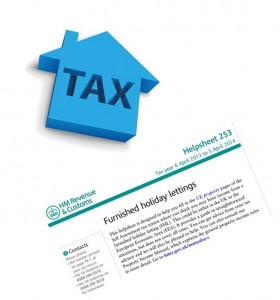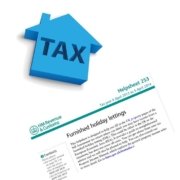How to qualify under the Furnished Holiday Letting Tax Rules
Last Updated on March 6, 2024 by admin
 When you rent a property it is usually treated as a form of investment activity rather than a trade. For example, if you had a job and owned a second home which you let on a shorthold tenancy agreement, the property would for tax purposes often be seen as you owning it as an investment, rather than an occupation which would provide you with profit.
When you rent a property it is usually treated as a form of investment activity rather than a trade. For example, if you had a job and owned a second home which you let on a shorthold tenancy agreement, the property would for tax purposes often be seen as you owning it as an investment, rather than an occupation which would provide you with profit.
For a holiday homeowner this scenario can be problematic; particularly if you own your holiday home with a view to creating a profit and a living from it, making it a trade rather than a pure investment.
This is where Furnished Holiday Lettings Rules (FHL) come in, providing potentially advantageous treatment of ‘self-catering’ accommodation. We take a closer look at how to qualify under the Furnished Holiday Letting tax rules.
Spring Budget 6th March 2024 – Update on the Furnished Holiday Letting Tax Rules
In the 2024 Spring Budget, the Chancellor Jeremy Hunt announced the governments intention to abolish the Furnished Holiday Lettings (FHL) tax regime from 6 April 2025, meaning short-term and long-term lets will be treated the same for tax purposes. Draft legislation will be introduced in due course. If passed, individuals with FHL and non-FHL properties will no longer need to calculate and report income separately. In the meantime qualifying holiday lets will continue to benefit from the furnished holiday letting tax rules until the tax year ending 5th April 2025.
What are the ‘Furnished Holiday Letting’ Tax Rules?
In order for your holiday home to qualify and benefit from this advantageous taxation treatment it must first meet all of the following criteria:
- Your holiday home must be located within the European Economic Area (EEA).
- Your holiday home must be let on a commercial basis with a view to making a profit from the lettings.
- Your holiday home must be furnished.
The occupation requirements
There are also several occupation requirements your holiday home will need to meet:
- Your holiday home must be available for at least 210 days (30 weeks) in a 12 month period.
- Your holiday home must be let to the public as holiday accommodation for at least 105 days (15 weeks) in a 12 month period. If your holiday home is new and unable to hit this occupation level it will be taken into consideration.
- If your holiday home is occupied by the same guests for more than 31 consecutive days, that ‘longer term’ form of occupation cannot add up to more than 155 days in a 12 month period.
- If you own more than one holiday home, an average would be taken across all of the qualifying properties meaning that if a single property fell beneath the required occupancy threshold it could potentially be buoyed up by other holiday homes that you own.
What if you have a bad year and don’t meet the requirements?
In order to continue to qualify as Furnished Holiday Accommodation your holiday home will not need to meet the occupation requirements every year.
You will be allowed to miss the thresholds for two consecutive years, with your holiday home ceasing to be qualify on the third year.
This means that as a bear minimum, your holiday home will need to meet the entire occupation requirement at least once every three years.
The benefits of qualifying as Furnished Holiday Letting Accommodation
There is a wide range of benefits associated with Furnished Holiday Letting Accommodation, which you should discuss with your accountant or another qualified professional.
These benefits include:
- Profits from furnished holiday lets are deemed “relevant earnings”, allowing for tax advantaged pension savings to be made that ordinary letting businesses do not qualify for.
- Capital allowances can be made on the capital expenditure you make on your holiday home. The first £250,000 of capital expenditure incurred by a person can qualify for 100% Capital Allowances.
- If you wish to sell your holiday home a range of Capital Gains Tax reliefs, usually only available to trading ventures, can be claimed. These could include Entrepreneurs’ Relief, Roll-over Relief and Hold-over relief.
- Many holiday home businesses will be run by a husband and wife team. In this case profits can be allocated in any proportion required, irrespective of their actual shares in the ownership of the property.
Here are some helpful links on the Furnished Holiday Letting Tax Rules:
- Furnished Holiday Lettings Tax Helpsheet 253 from HMRC
- Furnished Holiday Lettings Tax Guide from Boshers Holiday Home Owner Blog
- Furnished Holiday Lettings – A Tax Guide by John Endacott of Francis Clarke Chartered Accountants
Please note that this article gives only an overview of How to qualify under the Furnished Holiday Letting tax rules and we suggest you take advice from a qualified professional before making any decisions in this area.
As holiday home insurance specialists we understand the needs of holiday letting owners and our policy includes valuable legal expenses cover for HMRC taxation investigations provided that the insured has taken reasonable care to submit complete tax returns within statutory time limits. For more information on how a specialist insurer can help and support your holiday home business, please give us a call on 01237 429444.




What is a “day” when considering the 105 days threshold. If I have a let from 3pm on Friday to 10am on Monday is this 3 or 4 days? I assume that if the property was also let on the Monday from 3pm then I cannot count that day twice, but would both Friday and Monday count if there were no lets either side of this long weekend?
That’s a 3 day booking – Friday, Saturday Sunday.